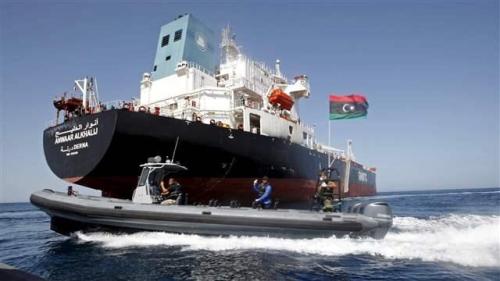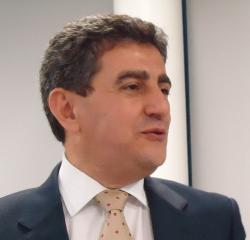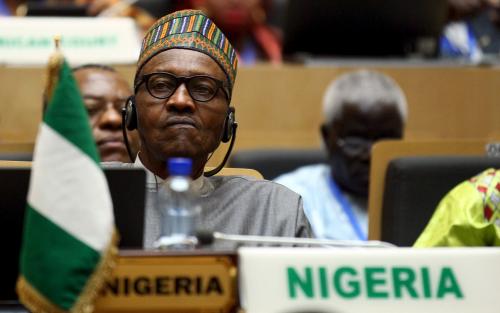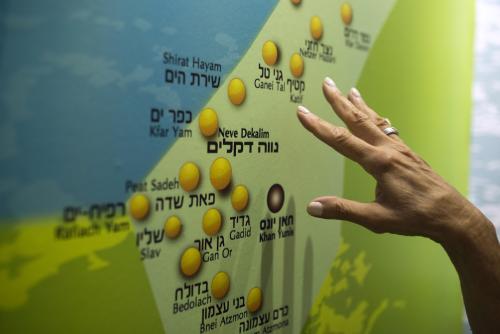

2:00 am +04 - 3:30 am +04
Past Event
Content from the Brookings Doha Center is now archived. In September 2021, after 14 years of impactful partnership, Brookings and the Brookings Doha Center announced that they were ending their affiliation. The Brookings Doha Center is now the Middle East Council on Global Affairs, a separate public policy institution based in Qatar.
The Brookings Doha Center (BDC) hosted a panel discussion on May 30, 2016, about the security of energy exports and energy transit from the Middle East and North Africa (MENA). The panelists were Robin Mills, nonresident fellow at the Brookings Doha Center; and Colonel Giuseppe Morabito, director of the Middle East Faculty at the NATO Defense College. Sultan Barakat, senior fellow and director of research at the BDC, moderated the event, which was attended by members of Qatar’s diplomatic, academic, and media community.
Barakat introduced the session by stating that the current unsettled environment in the Middle East raises concerns over energy security, both within the region and amongst energy consumers in Europe, the United States, India, China, and elsewhere. Threats to energy infrastructure exist at all scales, from individual acts of crime, sabotage, and terrorism to major regional wars and conflicts. We have seen large swaths of land fall under the control of non-state actors while states struggle to protect their territories. The Middle East houses some of the most important chokepoints in the energy transit, but also happens to be one of the most unstable regions in the world.
Mills started his remarks by highlighting paradoxes in the oil and gas markets today, where low global oil and gas prices are juxtaposed with high levels of global disruptions to energy transits. Concern over energy security is lacking as markets appear to pay less attention to risks, even though energy security faces some unprecedented challenges. Such indifference, he noted, may be appropriate for now given the oversupply and abundance of energy in the market. But even in the current market, some possible threats may have very severe effects on global energy supplies, threatening the economies of consumers, producers, and the global market alike.
Mills proceeded to list different risk scenarios. At the local level, he highlighted the threat of sabotage, where communities demanding a greater share of natural resources may block a pipeline or attack an export terminal; piracy, which, he argued, could emerge in regions beyond the coast of Somalia; and attacks by extremist groups, who are eager to get a hold on new sources of income. On a state level, there is the threat of major interstate wars between major exporters, which thankfully haven’t erupted yet. Past interstate wars, however, have had very significant impacts on energy security. The 1973 war between Israel and Egypt lead to an embargo that triggered the first oil crisis. The 1980s Iran-Iraq war resulted in severe damage to the oil production facilities of both countries and involved a tanker war which destroyed tankers passing through the Strait of Hormuz, resulting in an intervention by both the United States and the Soviet Union to protect shipping.
Hormuz, Mills continued, is one of numerous chokepoints—narrow channels along widely-used global sea routes that are crucial to the energy business. Given their narrowness, they tend to be obvious disruption targets. Hormuz carries about 17 million barrels per day (more than 20%) of oil exports. It is also the sole route for LNG export from Qatar, a crucial source of gas for East Asia and Europe. Other important chokepoints in the region are the Suez Canal, the southern entrance to the Red Sea, and the Bosporus Straits in Turkey. Any interruption of transit along those key areas would be highly detrimental.
Mills argued that, beyond attacks and wars, there is a broader and more diffuse threat to energy security, which has to do with investment. While it is true that investors can handle some level of risk in countries with moderate levels of insecurity like Nigeria, not all levels of insecurity can be worked with. At some point, insecurity can become too severe, deterring investment or even preventing it entirely. In the long term, this deters the development of promising new sources of oil and gas.
In response to a question from Barakat about NATO’s perspective on energy security in the Middle East, Morabito argued that NATO is particularly concerned about its gas supplies from the region, as most NATO countries rely on the region for gas. He argued that NATO’s policies, however, are primarily reactive, driven by events. No major events have interrupted energy supplies in recent times, so energy security is hardly on the agenda of NATO policymakers. There are more pressing issues these days, such as the threat of the Islamic State group (IS) and that of Russia’s Vladimir Putin.
In fact, Morabito continued, it is difficult to focus NATO’s attention on the issue because there doesn’t seem to be one. In the past, oil prices went up simply due to a war in Lebanon, which isn’t even an energy exporter. Today, however, we have a war that involves Saudi Arabia, the largest oil producer, but prices have been declining. The markets are very different today, mainly due to the development of shale technologies.
Nevertheless, Morabito noted that he thinks NATO, or some NATO nations, have intervened to secure their energy interests by training interstate groups such as the Kurds in Iraq or paying tribesmen in Algeria to protect pipelines that flow towards Europe. He noted that protecting pipelines is a costly business. A pipeline of 1,000 kilometers requires the presence of at least two soldiers every 50 meters; those two would have to work in shifts which necessitates hiring yet another two. Even then, an attack by only 50 militants would likely see the pipeline destroyed. This high cost makes it crucial to cooperate with local groups if proper security is to be insured.
Mills noted that European countries have become far less vulnerable to interruptions in supply, which were historically mainly caused by conflicts with Russia. He attributed that to interventions by the European Union to mitigate those vulnerabilities. He noted that in addition to institutional interventions, infrastructural development and market forces are also key in mitigating risks to the energy transit. When it comes to infrastructure, pipelines can be developed to bypass chokepoints, strategic storage can be built to provide countries with an emergency stock of oil and gas, and in some rare cases spare capacity can be employed to fill gaps in supply. Additionally, too often, government action to impose price controls, rationing, and export bans has proven to be counterproductive. It is important to allow the market to correct itself freely, although market mechanisms could be aided by better data.
After a Q&A session that asked about whether there truly are any real threats to Hormuz, the role that multi-national corporations can play in securing energy security, and threats to energy transit stemming from outside the MENA region. Barakat concluded by thanking the guests and stating that energy security is yet another reason why the region should work to resolve its differences and put an end to regional wars and rivalries.



Robin Mills
April 25, 2016

Ian Livingston
March 3, 2016

Daniel L. Byman
March 2, 2016